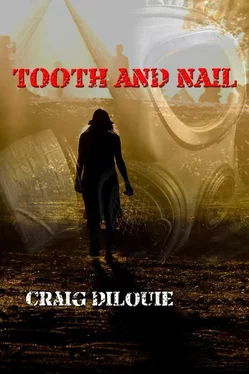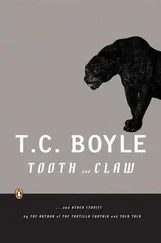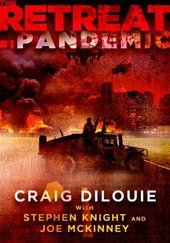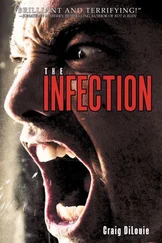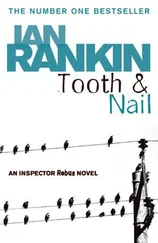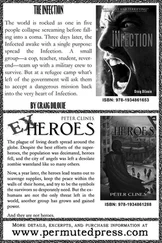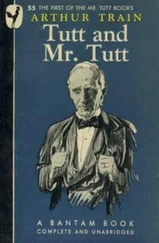Life is about to get a whole lot simpler. Just the law of the gun, and McLeod is hanging out with the people who have the best guns. As if to lend weight to this thought, the shooting to the south suddenly intensifies.
With each death out there, the world’s memory is getting shorter. A man could become reborn in this struggle and rename himself. No more living in the shadow of his great politician dad and his class clown past. During every screw-up in high school, McLeod would stand before his dad with a defiant smile, but the bastard never so much as blinked at him, too sanctimonious to lose his temper or even scold him his wayward son. Over time, the screw-ups got bigger, bolder, to get a reaction, any reaction. His upper-crust mother finally broke down, but he never won against dear old Dad of Steel. When he got caught shoplifting for the second time, his dad was through cleaning up his messes quietly behind the scenes, and McLeod was given a choice of jail or the Army.
When you screw up in the Army, you get a big reaction. Guaranteed.
McLeod smiles to himself as he realizes that Dad will probably survive after all. All the bigshot politicians are probably being squirreled away to secret bunkers. Even though his dad’s side is out of power right now, all the oligarchs stick together. First thing they’ll do when they get out is nuke the Chinese and hand over everything that’s left to the rich people. Can’t come out the other side of Armageddon and make a fresh start for humanity without bringing all our old problems with us, right-right?
He’d been looking forward to college, though. He loves to read and used to fantasize about spending hours cracking open volumes in the college library, growing smarter by the minute with the knowledge of the ages in his hands. He wanted to sit on the floor with a bunch of intellectuals who would appreciate his true genius. He wanted to study philosophy and try to figure out if there is any point to all of the misery he has already seen in his young life.
But there won’t be any more of that for a long time, he thinks. By the time the human race gets through this nightmare, in a few generations we’ll be lucky to be able to read a book.
“We should elect a new leader, like Bishop,” one of the grunts is saying. “Then we could do our own thing.”
“Know what I’d do? I’d go out and get some pussy. I’m freaking horny as hell and if we’re all going to die, why aren’t we going out and getting us some chicks? Especially since most of them seem to be dying.”
“You know what happens when civilians walk up to the door and Doc Waters takes them away? He makes them strip so he can check them for bites.”
“Even that chick that came in about an hour ago?”
“Oh, definitely.”
“Man, she was definitely hot.”
“You can’t elect your own leaders in the Army,” McLeod says. “If we stop following orders, there will be no more Army. We might as well all go off on our own and start looting and raping now until we’re killed a few hours later.”
“Yeah, that’s what we’re just saying, yo.”
McLeod grins. “What could you possibly steal that has any value anymore? Food, water, ammo, a safe place to sleep—these are the only things worth anything anymore. And we got them right here.”
“Oh, is there some pussy in my MRE that I missed?”
One of the other grunts chimes in, “What do you care what we do, McLeod? They sure as shit didn’t put you on this detail because you’re some super soldier.”
McLeod smiles to himself.
Then he stands up suddenly, spilling his unfinished chicken and dumplings onto the asphalt, his heart racing.
That sound—
Their security detail comes running past, heading into the school.
Like a flood—
He sees them coming.
“Into the school and down on the ground, boys!” Hooper roars.
They bolt inside, shut the doors, and throw themselves onto the floor. Hooper crouches by one of the doors, peering out of the window cut into its top half, through which the day’s final threads of sunshine are now streaming. His eyes grow wide and he jerks his head back, his chest rising and falling rapidly. His face has turned chalk white.
The first Mad Dogs run past the school. Hooper raises his fist to tell the boys to freeze, but they are scarcely even breathing. McLeod cannot see the army rushing by outside, but he sees the shadows dancing across the walls and ceiling, and he can hear them loud and clear, the tramp of their feet on the asphalt. He lays his ear to the ground and listens to the thunder. Tries to picture their pounding feet: boots, tennis shoes, broken high heels, sneakers, bare feet. The ground vibrates under his ear.
The seconds crawl by while the flood of humanity continues to flow past them. How many people is this? he wonders. A thousand? Five thousand? Ten?
It’s like a stampede of animals, he tells himself, which brings a sudden flash of insight. Animals stampede because something scares them. Are the Mad Dogs as scared of us as we are of them? Is that why they are so hostile—are they simply defending themselves?
McLeod slowly becomes aware that the Mad Dogs are growling. At first, it is like a river of individual sounds babbling in competition, but after a few moments, he begins to sense an underlying pattern. A rhythm emerges, repetitive and forceful. It is not a sound of fear. It is a sound of purpose and violence, like a religious chant or a tribal war song. The sound moves down the street like a massive locomotive and underneath it McLeod hears a constant ominous buzz that vibrates deep in his chest and makes his head ache.
Maddy is going to war.
Moaning, McLeod bites down on his sleeve and clenches his eyes shut.
The stampede gradually fades into the distance until silence returns.
“Jesus God,” one of the boys finally says. “I think I crapped my pants.”
The others crack grins, whistle, blow air out of their cheeks.
Sergeant Hooper opens one of the doors just enough to take a fast look around outside.
“Where are they going, Sergeant?” McLeod asks him shakily.
“Wait,” says Hooper, holding up his hand.
The boys fall silent, watching the NCO.
McLeod suddenly knows where the Mad Dogs are going.
To the south, the constant crackle of small arms fire is escalating.
Final protective fire
Bowman and Knight lean against the roof’s parapet and squint at the looming skyscrapers, now glittering with lights against a darkening sky. Behind the officers, Kemper and Vaughan chew on their cigars near one of the rooftop HVAC units, murmuring in a communal cloud of smoke. Sherman sits by the combat net radio, monitoring the nets, while Lewis scans the street with his sniper rifle and a fresh mag.
“The shooting’s stopped,” says Bowman.
“See anything?” Knight asks him, peering through his binoculars.
Bowman shakes his head.
The gunfire, steadily rising in volume over the past few minutes, stopped abruptly several moments ago. The vacuum was instantly filled with the clanging of a store alarm somewhere in their neighborhood, the buzz of distant helicopters and the dull roar of thousands of air conditioners, even though the evening is cool.
Bowman warned War Hammer Six by radio about the army of Mad Dogs headed his way. Captain Lyons thanked him for the intel and abruptly signed off. Alpha’s commander had few options as to what he could actually do with the information. He could either advance or retreat, and retreat at this point would mean surrender.
Lyons is a good officer, and would think things through. Bowman tried to imagine what was going through his mind. He could slow Alpha’s pace to give Bravo a chance to catch up and consolidate their firepower. But it is hard enough just to move one company through streets choked with cars and rubbish; two companies would be an unwieldy force of about a hundred and sixty men. And how much more firepower could he really bring to bear by combining their forces in firing zones that consisted of streets and doorways?
Читать дальше
